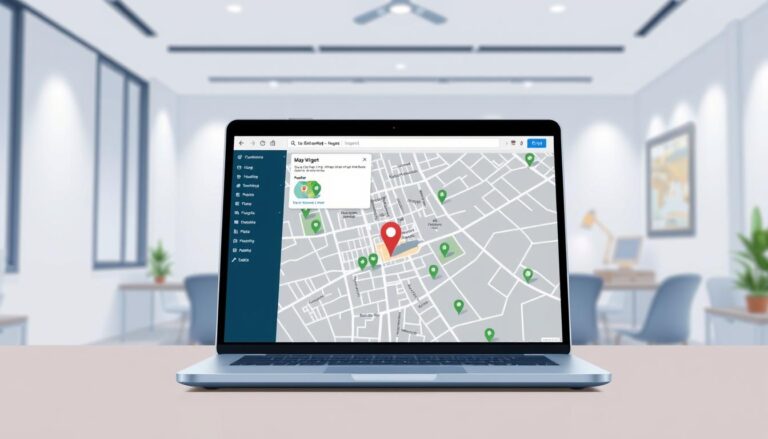I know how key local SEO is today. Businesses want to rank higher in search engines. Location-based strategies help attract the right people.
Using keyword research for specific areas boosts a business’s online presence. This method brings more people who are likely to buy to your site. It also ups your chances of making a sale.
Exploring location-based keyword optimization shows its importance. A smart plan is needed for businesses to top local search results.
Key Takeaways
- Local SEO is vital for businesses seeking to improve their search engine rankings.
- Keyword research is a critical component of a successful location-based SEO strategy.
- Targeted traffic is more likely to convert, making location-based optimization critical.
- A well-crafted location-based keyword optimization strategy can significantly enhance online visibility.
- Businesses must adapt to the evolving landscape of local search to remain competitive.
Why Location-Based Search Is Critical for Business Success
More and more people use their devices to find local businesses. This makes location-based search very important. The rise of mobile devices and voice assistants has made it easier to find businesses nearby.
The Impact of “Near Me” Searches on Traffic
“Near me” searches are a big reason for people visiting stores. Google says over 76% of smartphone users visit a business within a day after searching nearby. This shows how key it is to focus on location-based search to draw in customers looking for products or services locally.
How Google Prioritizes Local Results
Google puts local results first, looking at things like how relevant, close, and well-known a business is. Businesses with a strong online presence, accurate info, and good reviews are more likely to show up in local searches. By working on these areas, businesses can get more visibility and attract more local customers.
Essential Location-Based Keyword Research Techniques
Doing deep location-based keyword research is key for businesses wanting to boost their local search presence. It helps bring more people to their physical spots. This means knowing your audience, finding the right keywords, and checking out what competitors do.
Identifying Your Geographic Service Areas
First off, you need to know where you serve. This could be cities, neighborhoods, or even specific areas. Knowing this lets you focus on the right keywords for your audience. For example, if you serve many cities, you can make different lists for each one.
Tools for Discovering High-Value Local Keywords
There are tools that can find great local keywords for you. Google Keyword Planner and Google Trends are top picks.
Google Keyword Planner for Local Research
Google Keyword Planner is great for finding keywords that fit your business and area. You can filter by location to find the best keywords. For instance, you can find keywords like “coffee shop in New York.”
Leveraging Google Trends for Regional Insights
Google Trends shows what’s popular in different areas. It helps you see what keywords and topics are trending in your region. This info helps you make content that your local audience will love.

Analyzing Competitor Local Keyword Strategies
Looking at what your competitors do with keywords can teach you a lot. You can find their weak spots and use that to your advantage. Check their website, meta tags, and SEO to see how they target keywords.
Using these keyword research methods can help businesses get more seen online. It brings more people to their stores and can grow their sales.
Location-Based Keyword Optimization Strategies That Drive Rankings
Companies can boost their local search presence with the right location-based keyword strategies. This approach includes optimizing website content, creating effective landing pages, and aligning technical elements with local SEO best practices.
Optimizing Website Content with Geo-Specific Terms
Using geo-specific terms in your website content is key for local SEO success. For example, a New York business might use “New York boutique” or “NYC fashion store” to show they are local.
Creating High-Converting Location Landing Pages
Location landing pages are for specific areas. They should offer valuable info to users. Include local keywords, testimonials, and clear calls-to-action to encourage visits or contacts.
Local Keyword Integration in Title Tags and Meta Descriptions
Title tags and meta descriptions are vital for search engine visibility. By adding local keywords, businesses can stand out in local search results. For instance, “Best Coffee Shop in Seattle | The Daily Grind” includes the local keyword “Seattle.”
Optimizing URL Structure for Local Search
Optimizing URLs for local search means including local keywords. This helps search engines and users understand the page’s content. For example, “example.com/seattle-coffee-shop” is descriptive and optimized.
In conclusion, these strategies can greatly improve a business’s local search rankings. Focus on geo-specific terms, create effective landing pages, optimize title tags and meta descriptions, and structure URLs for local search. This way, businesses can attract more targeted traffic and enhance their online visibility.
Technical Foundations of Local SEO Success
Technical optimization is key to a successful local SEO campaign. It includes several important parts that help a website show up better in local search results.

Google Business Profile Optimization Essentials
Optimizing your Google Business Profile is vital for local SEO success. You need to claim and verify your business listing. Make sure your business’s name, address, and phone number (NAP) are accurate and consistent. Also, categorize your business correctly.
Keep your profile up to date with fresh content. Respond quickly to customer reviews. This boosts your local search visibility.
Implementing Local Business Schema Markup
Schema markup helps search engines understand your website’s content. For local businesses, adding schema markup with your NAP, hours, and reviews can greatly improve local search visibility. This structured data gives search engines the chance to provide better results to users.
Mobile Optimization for Location-Based Searches
Most local searches happen on mobile devices. So, mobile optimization is essential. Make sure your website loads fast and is easy to navigate on mobile. This improves user experience and is good for search engines.
Optimize for location-based searches by using geo-specific keywords. Also, make sure your site works well on smaller screens.
Measuring and Analyzing Your Location-Based Keyword Performance
It’s key to check how well your location-based keywords are doing. This helps you make your SEO better and rank higher in local searches. You need to know the important metrics that show if you’re doing well.
Key Performance Indicators for Local Search Success
To see if your location-based keyword plan is working, look at these important KPIs:
- Local search rankings: Keep an eye on where you rank for location-based keywords.
- Organic traffic: Watch how many people visit your site from local searches.
- Conversion rates: See how many visitors do what you want them to, like buying something.
- Google My Business insights: Check your Google My Business profile for views, clicks, and calls.
Tools for Tracking Local Keyword Rankings
There are many tools to help you track your local keyword rankings. Here are some top ones:
- Google Search Console: Gives you info on your site’s search traffic and rankings.
- Ahrefs: Offers detailed keyword tracking and competitor analysis.
- SEMrush: Has tools for tracking local keyword rankings and checking out what competitors do.
Adjusting Strategy Based on Local Performance Data
After you’ve looked at your location-based keyword data, use it to improve your SEO. Find out where you can get better and change your plan. For instance, if a keyword isn’t doing well, think about updating your content or meta tags.
By always checking and analyzing your location-based keyword performance, you can make your SEO better. This will help you rank higher in local searches over time.
Future-Proofing Your Local Search Visibility
Local search is always changing, and businesses need to keep up. I’ll look at new trends in local SEO. This includes voice search and how artificial intelligence affects rankings.
To stay ahead, it’s key to know the latest in local SEO. This means optimizing for voice search and using Google’s Google Business Profile fully.
Businesses should be proactive in local SEO. They should keep an eye on local keywords, adjust strategies with new data, and create content that speaks to locals.
This way, businesses can stay ahead in local search. It takes effort, but it’s worth it to attract more local customers.










